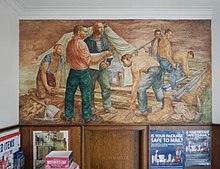Arthur Lidov
Arthur Herschel Lidov | |
|---|---|
| Born | June 14, 1917 |
| Died | December 29, 1990 (aged 73) |
| Nationality | American |
| Alma mater | University of Chicago, Sociology, Graduate Fellow in Art History |
| Occupation(s) | Artist, muralist, inventor and medical illustrator. |
| Organization | University of Chicago |
| Notable work | Cover art, First edition of Ray Bradbury's Martian Chronicles, asst. murals, inventor of Insertable Spokeless Wheel. |
| Style | Social Realism |
| Partner | Alexandra Wool |
| Children | Mika Lidov (daughter), Hart Lidov (son) |
Arthur Hershel Lidov (June 14,1917–December 29,1990) was an artist, illustrator, muralist, sculptor and inventor. Besides serving many national advertisers, he contributed his artistic expression to Life, Time, Fortune, The Saturday Evening Post and other general and special-interest magazines.
Education
Lidov, who was born in Chicago earned a degree in Sociology from the University of Chicago in 1936 and was a Graduate Fellow in Art History in 1938 and 1939.[1] As an artist, Lidov was largely self-taught, specializing in scientific and technical graphics.
Career

Arthur Lidov created the cover art for the 1950 first edition copy of The Martian Chronicle by Ray Bradbury. He contributed artistic backgrounds to many of the major magazines of his time such as Time, Fortune, The Saturday Evening Post and other special-interest magazines. He created what he called "medical landscapes' depicting internal organs for the article The Human Body:Part Two, "Down a Long Canal" in the December 7th, 1962 issue of Life magazine. [2] On February 25, 1970 Lidov was a commercial artist with a studio in New York adjacent to Mark Rothko. He was called to assist Rothko's aide at the moment of Rothko's suicide.[3] Lidov invented the Insertable Spokeless Wheel.[4]
Murals
Murals were produced from 1934 to 1943 in the United States through the Section of Painting and Sculpture, later called the Section of Fine Arts, of the Treasury Department.
- The Walter S. Christopher School, 5042 South Artesian Ave in the Gage Park neighborhood of Chicago contains three WPA tempera-on-plaster-on-presswood murals depicting Characters from Children’s Literature.[5] The mural was restored in 1999.
- The Chillicothe, Illinois Post office contains a Section of Fine Arts mural entitled Rail Roading painted using egg tempera on gesso in 1942.

Honors
- Works Progress Administration: Murals and Sculptures Commissions 1939–1943
- Select Exhibitions: Art Institute of Chicago, 1933, 1934, 1941.
- Pineapple Gallery, 1943
- National Academy of Art, 1958.
- Museum of Modern Art, 1962.
- J. Walter Thompson Gallery, 1964.
Awards
- Art Director’s Club Award, 1952, 1953, and 1959.
- Illustrator’s Club, NY, 1963, 1973, and 1974.
- American Institute of Graphic Arts Award, 1963
Personal life
Lidov was born on June 14, 1917 in Chicago, Illinois and died in his sleep on December 29, 1990 at his home in Poughquag, New York. Besides his wife, Alexandra Wool, also a painter, he was survived by his daughter, Mika and son, Hart.
References
- ^ Opitz, Glenn B, Editor, Mantle Fielding's Dictionary of American Painters, Sculptors & Engravers, Apollo Book, Poughkeepsie NY, 1986
- ^ Ruix, Vanessa. "Arthur Lidovs Medical Landscapes". streetanatomy.com. Street Anatomy. Retrieved 12 October 2015.
- ^ Seldes, Lee (1996). The legacy of Mark Rothko (1. DaCapo Press ed., updated ed., unabridged repub. of the ed. Holt, Rinehart, and Winston, New York, 1978. ed.). New York: DaCapo Press. ISBN 0306807254.
- ^ "Arthur Lidov, 73, Artist and Inventor". No. Obituaries. New York Times. January 2, 1991. Retrieved November 2, 2015.
- ^ "The Depression Era Art Projects in Illinois". lib.niu.edu. Illinois Periodicals Online. Retrieved 12 October 2015.
